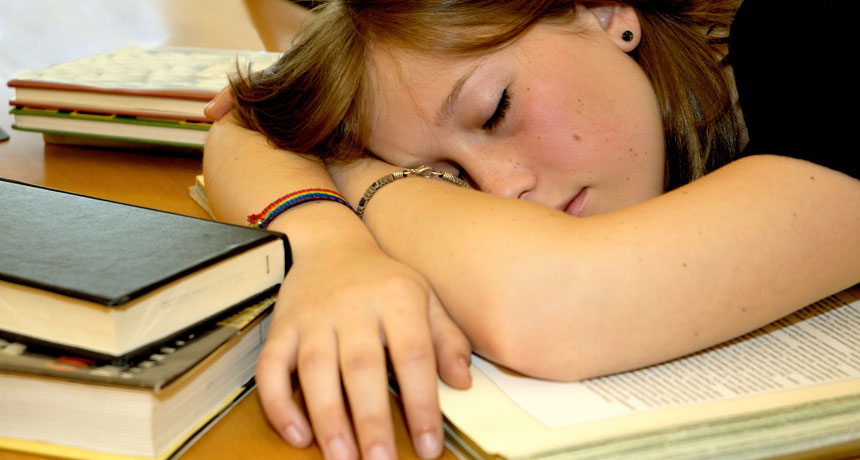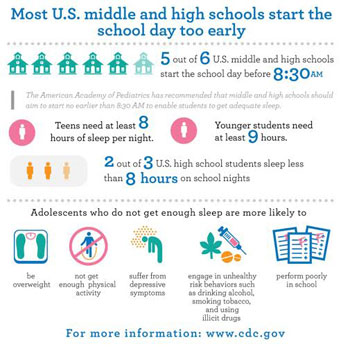Survey finds U.S. schools start ‘too early’
Majority of U.S. public middle and high schools start before 8:30 a.m.

A National Sleep Foundation poll found that more than a quarter of U.S. teens are so tired that they fall asleep in school at least once a week.
IMAGESBYTRISTA/ISTOCKPHOTO
It’s 8 a.m. and the first school bell rings. Some students zip through the halls. Others bumble along. It’s a common scene starting again across the United States. And it’s happening a bit too early in the morning for most tweens and teens, a new survey finds.
Starting school too early is not just a student complaint. It’s an observation backed by science, says Anne Wheaton. She works at the Centers for Disease Control and Prevention (CDC) in Atlanta, Ga. As an epidemiologist, she probes the causes behind health problems. Her focus has been health problems linked with teens’ lack of sleep.
For a new study, she and her colleagues looked at the start times of an estimated 39,700 U.S. public schools during the 2011-2012 school year. The average start time was 8:03 a.m., they reported August 7 in Morbidity and Mortality Weekly Report.
That’s too early, Wheaton says. Tweens and teens are experiencing shifts in their natural sleep cycles. Their bodies’ inner “clocks” make it hard for them to go to bed before 10:30 or 11:00 p.m. But to get to school on time, they have to wake up as early as 5:30 a.m. A first school bell just after 8 a.m. slices into the 8.5 to 9.5 hours of sleep tweens and teens need to be healthy and perform at their best, she says. “We’re fighting biology.”

In fact, Alaska and North Dakota are the only states to have a majority of schools meet the school-start guidelines recently set by the American Academy of Pediatrics. This professional group includes more than 60,000 doctors who treat or study children. In 2014, the group recommended that middle and high schools start no earlier than 8:30 a.m.
The new CDC survey provides a baseline of school-start times against which scientists will be able to track any changes, says Daniel Lewin. He is a doctor and sleep expert at the Children’s National Health System in Washington D.C.
Starting school too early forces teens to lose a large chunk of what’s known as REM — or rapid eye movement — sleep. This type of sleep helps teens (and everyone else) control their moods. But that’s not the only problem. Too little sleep also has been linked with an increased risk of obesity, depression, drug use and other problems.
Indeed, Wheaton’s colleagues at CDC published a major analysis in Pediatrics last year about all of the problems teens can experience if they get too little sleep. Janet Croft of CDC (a coauthor on the new paper, as well) concluded: U.S. schools “start at such an early time that most teens are essentially brain dead when they go to these early classes.” As a result, she says, many of them start their day as “walking zombies.”
The call for later school start times is an essential movement for keeping tweens and teens healthy, Lewin explains.
Wheaton says she and her colleagues understand that the change in school start times is not going to happen overnight. The goal, she says, is to make sure everyone knows how important sleep is and that school start times can greatly affect how much sleep adolescents get each night.
Power Words
(for more about Power Words, click here)
adolescence A transitional stage of physical and psychological development that begins at the onset of puberty, typically between the ages of 11 and 13, and ends with adulthood.
anxiety A nervous disorder causing excessive uneasiness and apprehension. People with anxiety may even develop panic attacks.
biological clock A mechanism present in all life forms that controls when various functions such as metabolic signals, sleep cycles or photosynthesis should occur.
Centers for Disease Control and Prevention, or CDC An agency of the U.S. Department of Health and Human Services, CDC is charged with protecting public health and safety by working to control and prevent disease, injury and disabilities. It does this by investigating disease outbreaks, tracking exposures by Americans to infections and toxic chemicals, and regularly surveying diet and other habits among a representative cross-section of all Americans.
depression A mental illness characterized by persistent sadness and apathy. Although these feelings can be triggered by events, such as the death of a loved one or the move to a new city, that isn’t typically considered an “illness” — unless the symptoms are prolonged and harm an individual’s ability to perform normal daily tasks (such as working, sleeping or interacting with others). People suffering from depression often feel they the lack of energy to get anything done and have difficulty concentrating on things or showing an interest in normal events. Many times, these feelings seem to be triggered by nothing; they can appear out of nowhere.
epidemiologist Like health detectives, these researchers figure out what causes a particular illness and how to limit its spread.
obesity Extremely overweight. Obesity is associated with a wide range of health problems, including type 2 diabetes and high blood pressure.
pediatrics Relating to children and especially child health.
puberty A developmental period in humans and other primates when the body undergoes hormonal changes that will result in the maturation of reproductive organs.
REM sleep A period of sleep that takes its name for the rapid eye movement, or REM, that occurs. People dream during REM sleep, but their bodies can’t move. In non-REM sleep, breathing and brain activity slow, but people can still move about.
survey (in statistics) A questionnaire that samples the opinions, practices (such as dining or sleeping habits), knowledge or skills of a broad range of people. Researchers select the number and types of people questioned in hopes that the answers these individuals give will be representative of others who are their age, belong to the same ethnic group or live in the same region.
tween A child just approaching his or her teenage years. Tween is a term usually used for 11- to 12-years olds.







